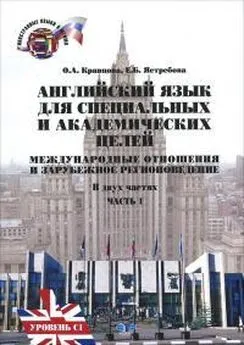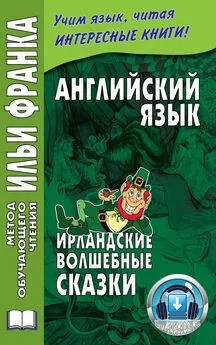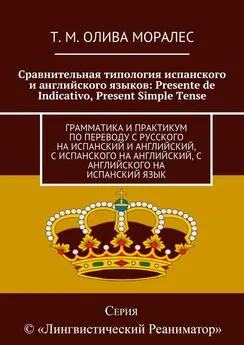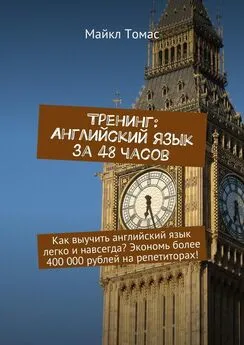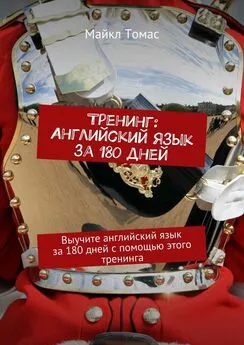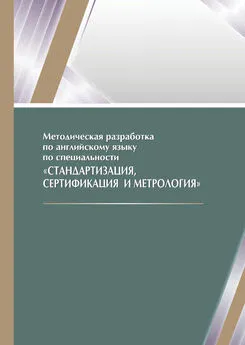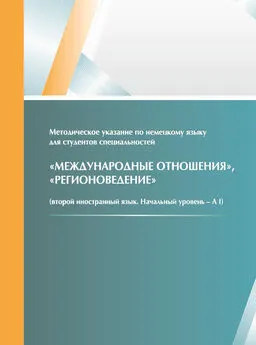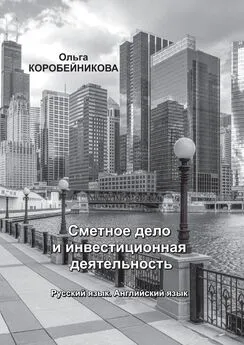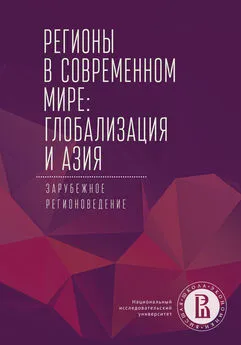Ольга Кравцова - Английский язык для специальных и академических целей: Международные отношения и зарубежное регионоведение. Часть 1
- Название:Английский язык для специальных и академических целей: Международные отношения и зарубежное регионоведение. Часть 1
- Автор:
- Жанр:
- Издательство:МГИМО-Университет
- Год:2015
- ISBN:978-5-9228-1210-8
- Рейтинг:
- Избранное:Добавить в избранное
-
Отзывы:
-
Ваша оценка:
Ольга Кравцова - Английский язык для специальных и академических целей: Международные отношения и зарубежное регионоведение. Часть 1 краткое содержание
Адресовано студентам четвертого курса факультетов и отделений международных отношений и зарубежного регионоведения.
Английский язык для специальных и академических целей: Международные отношения и зарубежное регионоведение. Часть 1 - читать онлайн бесплатно полную версию (весь текст целиком)
Интервал:
Закладка:
Two sociologists, Michael Young and Ed Shils, had joined the crowds in the East End of London, dropping in on street parties to find out. Their thesis, entitled The Meaning of the Coronation, accepted that there were some who had dismissed the whole affair as a ridiculous waste of money.
But overall, they concluded: “The Coronation provided at one time and for practically the entire society such an intensive contact with the sacred that we believe we are justified in interpreting it as we have done in this essay, as a great act of national communion.”
Britain — battered, bruised and broke — appeared determined to embrace its monarchy and hang the cost. The paradox is that austerity was positively comfortable with ostentation; institutional challenge spawned a passion for hereditary authority.
It wasn't just that Britain wanted a distraction from hardship and uncertainty. Enthusiastic support for monarchy seemed to run counter to the new liberalism which was guiding the politics of post-war Britain.
The explanation, I think, is that the 1950s were also a period in which the country was anxious about how global, institutional and social change might threaten its identity.
The impact of Americanisation as well as colonial and European immigration upon British life were a source of great concern. Despite winning the war, it appeared that national power and influence were being lost. Institutional authority was being questioned.
There were fears, too, that the values and traditions which underpinned family and community life were also changing rapidly. War and financial hardship had combined to shake up and challenge ancient orthodoxies.
The Reader
Monarchy represented a bulwark against rapid and scary change.
Sixty years after our Queen assumed the throne, many of those same anxieties remain. Concerns about how globalisation and immigration are changing Britain continue to trouble us. Respect for institutions has declined as the global financial crisis has ushered in a new era of austerity.
In Accrington earlier this month, I watched a down-to-earth, no-nonsense town go slightly mad for the Queen. Thousands lined the streets, hung out of windows, climbed lamp-posts to catch a glimpse of their monarch.
They stood for hours in a chilly wind wearing daft hats — a metaphor for the attitude of their country. Times are tough, the challenges are great and we respond by cheering an aspect of our culture that, for all its irrationality, is uniquely ours.
The British have always chosen the quirks of our history against foreign rationalism. The Romans brought us straight roads and decimalisation. As soon as they left, we reverted to impossibly complicated Imperial measures and winding country lanes.
“Start Quote
The Normans commissioned the Domesday Book to try and impose order on bureaucratic chaos but had to compromise at every turn. That is how we ended up with something called Worcestershire — a place that foreigners find impossible to pronounce, never mind spell.
The British don't like straight lines. When we look at those maps of the United States with rulerstraight state boundaries, we feel pity. Walter Bagehot understood that our identity is found in the twists and turns of a rural B-road, not in the pragmatism of a highway.
It is the same with our system of governance. Logic is not the most important factor. We are happy to accept eccentricity and quirkiness because they reflect an important part of our national character.
So in trying to explain the unlikely success of the monarchy, we shouldn't expect the answer to be based on reason.
It is not a pocket-book calculation of profit and loss — how much does the Queen cost compared to what she brings in for the tourist trade?
It is not a question of prevailing political attitudes — how can a liberal democracy justify power and privilege based on an accident of birth?
The British monarchy is valued because it is the British monarchy. We are an old and complicated society that yields a deference to the theatrical show of society.
к
THE ATLANTIC http://www.theatlantic.com/international/archive/2012/02/its-the-queens-60th-anniversary-why-is-britain-still-a-monarchy/252608/
The British royal family is an expensive anachronism and little more.
The Reader
Today is the sixtieth anniversary of Queen Elizabeth II's ascension to the British throne, which occurred upon her father's death in 1952. Happy anniversary — or Diamond Jubilee, as it is known — Your Majesty. Now: what exactly are you still doing there, anyway?
Nostalgia and the royals' tourist appeal aside, there's something a bit jarring both to logic and to liberal democratic sensibilities about what the queen stands for. After all, British “citizens” are still at least nominally, and arguably legally, considered “subjects.” The United Kingdom's Home Office and the passports it issues reflect the country's switch in 1949 from the language of subjecthood to citizenship, and thus make a distinction between “citizens of the United Kingdom” and “British subjects.” That's not a particularly pretty distinction, since the latter is mostly a leftover of the country's imperial era.
But as plenty of experts have pointed out, there is no piece of paper that officially designates Brits as “citizens.” And if a magazine-length article can be written under the headline “Are we subjects or citizens?” as the BBC did in 2005, whatever scraps of citizenship clinging to Britons can't be all that substantial.
The financial side of the British monarchy is no less quirky. Governing for payment is standard, but the queen reigns, which appears mostly to mean visiting things. Strange as this looks from a practical standpoint, it's even stranger in theory. In 2012, why would the people of a Western state pay someone to subjugate them? That Britain is Western matters here not so much because of values but because of history. The British state was arguably the first in the region to be organized along the principles of an explicit social contract; it's the heir to the English Magna Carta in 1215 as well as the Glorious Revolution, where, for the first time, monarchs — King William and Queen Mary — were brought in to accept a crown on the subjects' own terms. Yet, in a twist that continues to fascinate historians, William and Mary paved the way for remarkably conservative stability in the ensuing centuries. France, as the trope goes, had a political revolution, Britain had an industrial one. And here the two countries are today, France heading into the final stretch of a presidential election, while a not insignificant portion of the British economy gets poured into preparations for a June-weekend Diamond Jubilee of a figurehead queen, who Britons never explicitly agreed to support.
Though the March 2011 financial report on royal finances proudly announced a 19% decrease in the Queen's official expenditure over the course of five years, is this really much solace? Her family will still spend £32.1 million, quite a lot of money. Remarkably, UK education secretary Michael Gove reportedly also wanted the public to donate a £60 million royal yacht to Her Majesty for the 2012 celebrations, although the details of that proposal are disputed, and private donations were mentioned as well.
Downing Street nixed the public funding idea, fortunately. Prime Minister David Cameron did declare early Monday, though, that “Today is a day to pay tribute to the magnificent service of Her Majesty the Queen.” Her “experience, dignity, and quiet authority,” he also mentioned are indisputable, but “pay tribute” seems a bit too atavistically close to home for comfort, and Brits don't have as much tribute to give up as they used to. And “magnificent service”? No one doubts the queen keeps a pretty punishing schedule of standing in formal ceremonies and visiting schools for a lady her age — but there are a few palaces and a lifetime source of income in the deal.
The royal wedding is over. Kate's and Pippa's dresses were fantastic, and the hats were fun. No argument there. As a privately funded theme park, the royals have real potential. The monarchy, so the crown defenders' argument goes, does indeed bring in cash for the country through tourism and from the Crown Estate. But the current set-up is bizarre, and the frenzied yearning for a U.S. equivalent among so many of my American countrymen and women last spring was puzzling. In the cold, clear light of this less glamorous royal event, the monarchy looks like exactly what it is: a major anachronism. Nothing more.
The Reader
The repeated freezing of the Civil List merely adds to the monarchy's value, says Gerald Warner.
By Gerald Warner, the Telegraph
23 Jun 2010 http://www.telegraph.co.uk/news/uknews/theroyalfamily/7850335/The-Royal-family-is-a-bar-gain-for-Britain.html
Among the mind-boggling macroeconomic statistics rattled off by George Osborne in his Budget statement, one figure stood out in its extreme modesty: the £7.9 million Civil List payment to the Queen, frozen for the 21st year in succession. Allocated by John Major, as chancellor, in 1990, it has since lost 76 per cent of its value. The Queen must be alone among public-sector workers in accepting such a real terms reduction in income over so long a period. She is also unique in continuing to work aged 84.
The official Treasury announcement stated: “Royal Household spending on support of The Queen in Her duties as Monarch in 2011 will fall from £15.1 million to £14.9 million. The £7 million difference will be financed from the Civil List Reserve.” Because the Queen prudently set aside savings in the earlier years, when the £7.9 million payment was worth more, now that the proverbial rainy day has arrived she has reserves to draw upon. Gordon Brown, at his weekly audiences, might profitably have taken advice from her majesty on the prudent management of public funds.
The Civil List was established in 1760, when George III surrendered the income from the Crown Estate to the government in exchange for a fixed annual payment from the Treasury. The taxpayer gained an exceptional bargain from that arrangement: last year, total government spending on all functions of the monarchy amounted to £7.9 million from the Civil List, £22.6 million in grants-in-aid for communications, travel and property from the Department for Culture, Media and Sport, and £4.6 million from other departments. That total of £35.1 million is dwarfed by the £226.5 million profit passed to the Treasury by the Crown Estate.
Critics of the royal finances have no real case. Last year, Norman Baker, the Liberal Democrat MP, claimed: “If the Royal family are convinced they are offering value for money, they should subject themselves to the Freedom of Information Act like every other part of the public sector. Until there is that level of transparency, any rise should be resisted.” Clearly, he was heedless of Walter Bage-hot's maxim regarding the monarchy: “We must not let daylight in upon the magic.”
In any case, daylight is flooding in: from 2012, the Civil List will be audited by the National Audit Office, which will lay its findings before Parliament to be scrutinised if it wishes.
The monarchy costs 69p a year for every person in Britain, or £1.33 per taxpayer. In return, besides the Crown Estate profits, there is the unquantifiable, but enormous, tourist revenue it generates. Claims that a republican head of state would be less costly are absurd. The German presidency costs about the same as the Queen, but how many tourists line the streets of Berlin to catch a glimpse of — er — what is his name?
Читать дальшеИнтервал:
Закладка:
